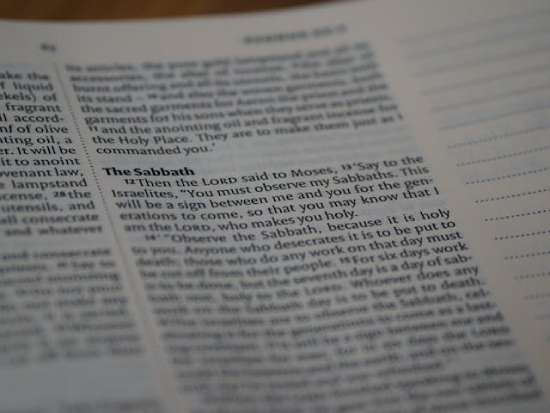Though most Protestant Christian denominations observe “the Lord’s Day” on Sundays, or the first day of the week, Seventh-day Adventists observe Saturday—the biblical seventh-day Sabbath God established when He rested after creating the world during the previous six days (Genesis 2:2-3).
Adventists observe and celebrate the seventh-day Sabbath from Friday evening (sunset) to Saturday evening. This is to acknowledge God as their Creator, grow in their relationship with Him, and rest from the cares of everyday life. They often gather for Sabbath worship services on Saturday mornings.
To understand how this all began, let’s look back at how God set the seventh day apart as a special day to reconnect with Him and reflect upon His creation.
- Why the seventh day (Saturday) is special to God
- Why Saturday is special to Adventists
- Whether Sabbath-keeping is legalism
- Whether the day you worship really matters
We’ll start by looking in the first book of the Bible.
Why is Saturday special? Pausing, reflecting, and being intentional.

Photo by Alabaster Co on Unsplash
Saturday is special to God because it’s the seventh day of the week—the day He sanctified and set apart in the Garden of Eden as a memorial.
The Bible in the Old Testament tells us that:
“God blessed the seventh day and sanctified it, because in it He rested from all His work which God had created and made” (Genesis 2:3, NKJV).
The “seventh day” refers to Saturday, according to both Hebrew and traditional Christian calendars. God sanctified this day, meaning He made it special and set it apart as a holy day where people transition from working, striving, and creating to resting, enjoying, appreciating, and reflecting—just as He did on the very first Sabbath.
The Sabbath is meant to be a sign between us and God, a regular expression of our appreciation and devotion (Ezekiel 20:20). Adventists believe keeping the Sabbath also acknowledges God’s creative work in making the Earth before He rested on the seventh day.
What’s more, the fact that God established the seventh-day Sabbath at Creation tells us that celebrating the Sabbath on Saturday isn’t something only for ancient Israel or the Jewish faith. It’s for all humanity to experience.
There is a circulating assumption that the seventh-day Sabbath was done away with by the creation of the New Covenant. But the truth is, God’s command to keep the Sabbath wasn’t a part of the mosaic law or Jewish tradition but a part of God’s unshakeable law—the Ten Commandments. And it was meant to be for our enjoyment and enrichment! Not like the drudgery the Pharisees turned it into, like we read about in the New Testament Gospel accounts.
And let’s remember that the Ten Commandments aren’t an arbitrary list of rules. They teach us to live fulfilling lives by showing us what it means to love God (the first four) and love others (the last six).
The fourth commandment about worshiping on Saturday is no different.

Photo by Brett Jordan
It’s a law that explains how we can express our love and devotion to God—by setting aside the day He declared holy.
God intended for Saturday to be a time for us to put aside our regular work and rest from our labor (Exodus 20:8-10). It involves a shift—a pause. By stopping our work, we are given a break from feeling like we have to be producing something or achieving something every single minute. This pause allows us to be more aware, contemplative, and reflexive.
Think about it like this. Say you went to visit someone you cared about. Would you feel like you really connected with them if the whole time you were there, they kept right on working and tackling their to-do lists? If their attention stayed on all the “stuff” that fills their days? If they didn’t set aside time just to sit with you, focus on you, and talk to you?
And we’ve all had those friends who always seem to be preoccupied with other thoughts when you’re trying to have a conversation with them. Maybe they want to be around you, but the whole time they’re distracted and not fully present. It just doesn’t feel like you’re a priority, or that your presence and attention are appreciated.
To add to that, let’s be honest. We humans typically have trouble stopping, pausing, or putting our lists and worries aside. Sometimes we even feel guilty if we do so. That being the case, Sabbath can be seen as God’s permission to unplug, stop stressing about our weekly obligations, and take the time to notice and experience His blessings.
Notice what the following verse says about this:
“Six days shall work be done, but the seventh day is a Sabbath of solemn rest, a holy convocation. You shall do no work on it; it is the Sabbath of the Lord in all your dwellings” (Leviticus 23:3, NKJV).
“Work” or “labor” in this context refers to our trades, the day-to-day business we participate in to make a living and support our households. The obligatory things we have to do each weekday that take up our mental energy and attention. It doesn’t mean we refrain from anything that takes physical or mental effort. That’s not the focus.
One way to look at it is that we set aside “business” on the Sabbath.
This is also expressed in Isaiah 58:13-14, going over the sorts of things that are beneficial for us to set aside on the Sabbath. It mentions not “talking business” (CSB) or “not pursuing your own business” (ESV).
That’s a big part of what “solemn rest” means. It’s not just catching up on sleep or taking it easy. It’s disconnecting ourselves from the distractions and stresses of the world. It’s tapping into the profound rest God participated in after creating the world. This is how we switch gears from making to enjoying.
This kind of rest also provides an ideal opportunity for gathering together with family, or those we care about, and as a faith community. Enjoying one another as fellow creations of our Creator God. That’s what’s behind the mention of “holy convocation,” or gathering together for a divine purpose.
All of this boils down to the core motivation for Seventh-day Adventists worshiping together on Saturdays and observing it as Sabbath: love for God and love for one another.
Why is Saturday special to Adventists?

Photo by George Dolgikh
Saturday is special for Seventh-day Adventists because it was created by God to benefit us and regularly enrich our relationship with Him. It reminds us of His role as our Creator, and we take that weekly opportunity to focus on Him and what He’s done for us while resting from the stress of daily life.
We can see this sentiment in the words of Ellen G. White, co-founder of Seventh-day Adventism:
“Because He had rested on the Sabbath, ‘God blessed the seventh day, and sanctified it,’—set it apart to a holy use. He gave it…as a day of rest. It was a memorial of the work of creation, and thus a sign of God’s power and His love.”1
Adventists observe the Sabbath from Friday evening to Saturday evening because, as it says in the Bible’s account of the days of creation, God counts a full day as being from evening to evening (Genesis 1:31; Genesis 2:2). This means that Sabbath begins as the sun goes down on Friday and ends as the sun goes down on Saturday.
Adventists typically attend church services and Bible study (Sabbath school) each Saturday. But we also believe in worshiping God every day of the week, from Sunday to Saturday. God calls us to live lives of worship, bringing glory to Him in all the things we do.
This daily worship can take various forms, such as personal devotions in the morning, evening worship with family, or even taking small moments during the day for reconnection through prayer.
Many Seventh-day Adventist institutions such as academies, universities, businesses, conference offices, and media outlets hold times of worship with their co-workers before the work day begins.
There are Adventist congregations that meet together in small groups for prayer on Sundays, Wednesdays, Fridays, or every day. Some church members gather in each others’ homes for worship or Bible studies during the week.
There are countless ways we can worship God. Our very lives can bring glory to Him as we’re led by the Holy Spirit.
But we believe worship on the Sabbath should be special. God told us to keep it holy, and so we observe the Sabbath by abstaining from work and focusing our attention on growing our relationship with Him.
Regularly abstaining from work is like saying we are not made holy by our own works, but by relying on God.
He is our sustenance—“In Him we live and move and have our being” (Acts 17:28, ESV). And it’s also through Him that we experience true rest.
The founders of the Seventh-day Adventist Church learned the truth of observing Saturday as the true day of worship in the 1840s from the Seventh-day Baptists. They helped us understand that devoting this day of each week to God was something He still wanted us to experience.
And the early Adventists’ continual, collective study of Scripture confirmed that truth. The seventh-day Sabbath was observed by Jesus Christ Himself (Luke 4:16) and by His believers throughout the Word of God, including the early Christian Church (Mark 15:42-47; Acts 13:14-17; 16:13; 17:2; 18:4).
Is Sabbath-keeping legalism?
Is observing any of the Ten Commandments considered legalism? Or anything in Scripture that is expressed as instruction from God?
Only if those commands or instructions are being observed to somehow “earn” favor with God, or to achieve a higher level of worthiness or holiness.
Observing the seventh-day Sabbath is part of God’s law, the Ten Commandments. We keep the Sabbath described in the fourth commandment just like we’d keep any of the other nine.
Keeping God’s commandments isn’t supposed to be about “works” or “legalism.” Adventists do not believe that any of God’s laws can or should be kept for the purpose of earning salvation by human efforts.
Just as we keep the other commandments out of love for God and in recognizing His wisdom and guidance, it’s the same with the Sabbath. It’s not about gaining favor but about remembering who He is. It’s about yielding to Jesus Christ, our Savior, and resting in His grace.
God wants us to keep the Sabbath because we love Him and trust that His laws are only designed to enrich our lives and bless us. After all, He created us with freedom of choice so that we wouldn’t keep His commandments out of obligation, fear, or to “appear” holy.
And yet, many have misunderstood what the Sabbath is truly about. Some have even twisted its meaning as a way to control their communities and make themselves feel more holy than others:
In Jesus’ time, the Pharisees made strict rules about how their fellow Jews should keep the Sabbath. This caused a lot of people to see the Sabbath as a day of strict religious ceremony instead of a sacred, joyful occasion to focus on God.
They even accused Jesus Himself of breaking the Sabbath (John 5)! That alone demonstrates how contrary the Pharisee’s rules were compared to what God asks of us.
Jesus explained that God never intended for the Sabbath to be kept with the staunch legalism of the Pharisees. He told them that the Sabbath wasn’t meant to be a burden but a blessing, stating that the Sabbath was created for humanity, not the other way around (Mark 2:27).
When we keep the Sabbath as God commanded, we open ourselves up for His blessings and seek to share them with others. Sabbath is a great opportunity to commune with fellow believers at church and look for ways to serve others in our community.
We could think of God’s commandments in a similar way to how parents generally aim to make rules for their children out of love. Their goal is to keep their kids as healthy and happy as possible, hopefully helping them avoid some of life’s traps or temptations. It’s not out of a want of control or power. And, parents ideally hope that their kids keep those rules out of love and respect, not out of fear or as ways to earn “brownie points.”
God is like our all-powerful, all-loving, perfect parent. Our Creator. All of us are God’s people. And He knows that true Sabbath rest can benefit us in numerous ways.
Resting helps us recuperate after six days of work. It gives us the opportunity to refresh our strength, relax our minds, and put aside the pressure and stress that comes with our busy lives.
The Lord calls for anyone who is weary and burdened to come to Him for rest (Matthew 11:28).
In Hebrews 4:10 we read:
“He who has entered His rest has himself also ceased from his works as God did from His” (NKJV).
Sabbath rest reminds us that in Jesus we have rest—we are saved by His righteousness and not by our works. And because we are saved by His righteousness alone, He gives His people grace and power to keep His commandments in the very way He asks us to.
Does it matter which day is the Sabbath?

Photo by Blessing Ri on Unsplash
Yes, the Sabbath day was specifically instituted by God, way back in Genesis, to be on Saturday, the seventh day of the week.
To keep the Sabbath on any other day than Saturday goes against what the Bible has to say about the subject. Keeping the seventh day honors God’s sanctification of Saturday at Creation, and His commandment to keep that day holy.
Think about a husband and wife who celebrate their anniversary every year. Every day of the year, they show love to each other but they recognize that their wedding anniversary is a special day. They celebrate on that day as an expression of their love and devotion to each other.
Now suppose one of them decided they wanted to change the anniversary date. Instead of celebrating on, say, September 17th, they want to change the anniversary date to September 18th. Despite the preference or reasoning behind that change, however, their anniversary would always be on September 17th because that’s the date they got married.
After Creation, on the seventh day, the Bible tells us that:
“God completed His work which He had done, and He rested on the seventh day from all His work which He had done. Then God blessed the seventh day and sanctified it because He rested from all His work which God created and made” (Genesis 2:2-3, NASB).
We can see it clearly right there. God set apart Saturday as His special Sabbath. He consecrated it, asking us to keep it to honor and spend time with Him so we could enjoy the blessings that come with Sabbath rest.
Sabbath helps prepare our minds for worship
For Adventists, the seventh-day Sabbath is indeed a day for worship.
But it’s more than just attending a church service.
It’s a way to prepare our minds to worship. In a world of constant hustle and activity, this day of rest is a haven from the busyness of life that helps put us into that mindset. This way, we can focus on what truly matters in life—our relationship with Jesus Christ and the relationships we have with one another.
Would you like to learn more about what this special day is like?
Choose an Online Bible Study
Want to keep learning? Find out more about Jesus, humanity, the plan of salvation, and how God loves you enough to sacrifice everything, just to give you a chance to choose Him.
Sometimes it can be hard to know where to start, that’s why we offer free, user-friendly, online Bible study options you can do anytime, anywhere, and at your own pace.
This online Bible school will take you through the major themes of Scripture, breaking down the Bible’s complex concepts into bite-sized pieces, which can lead you toward the answers of life’s more challenging questions.
Related Articles
- White, E. G. (1898). The Desire of Ages. Mountain View, CA: Pacific Press Publishing Association.[↵]
More Answers
No Results Found
The page you requested could not be found. Try refining your search, or use the navigation above to locate the post.



